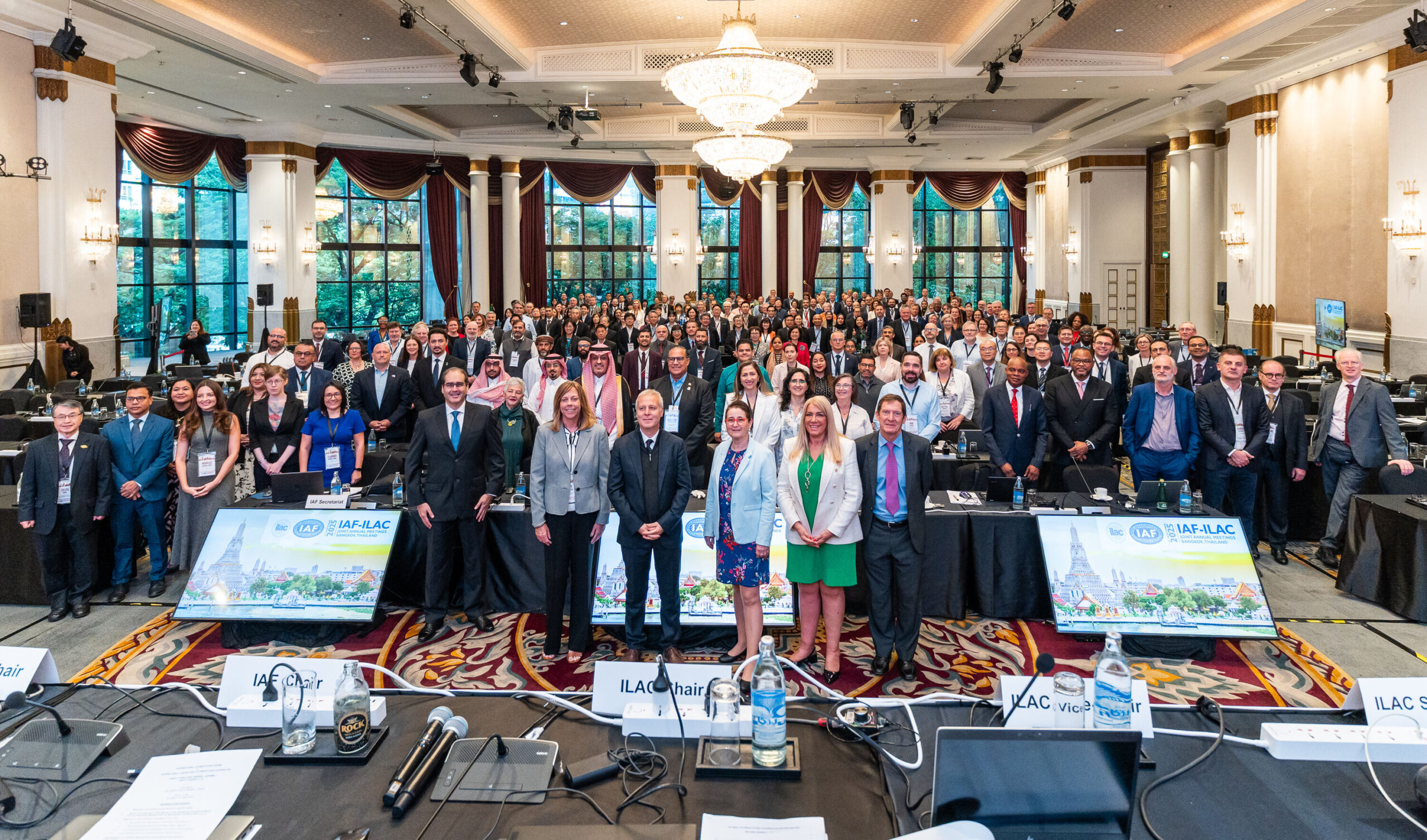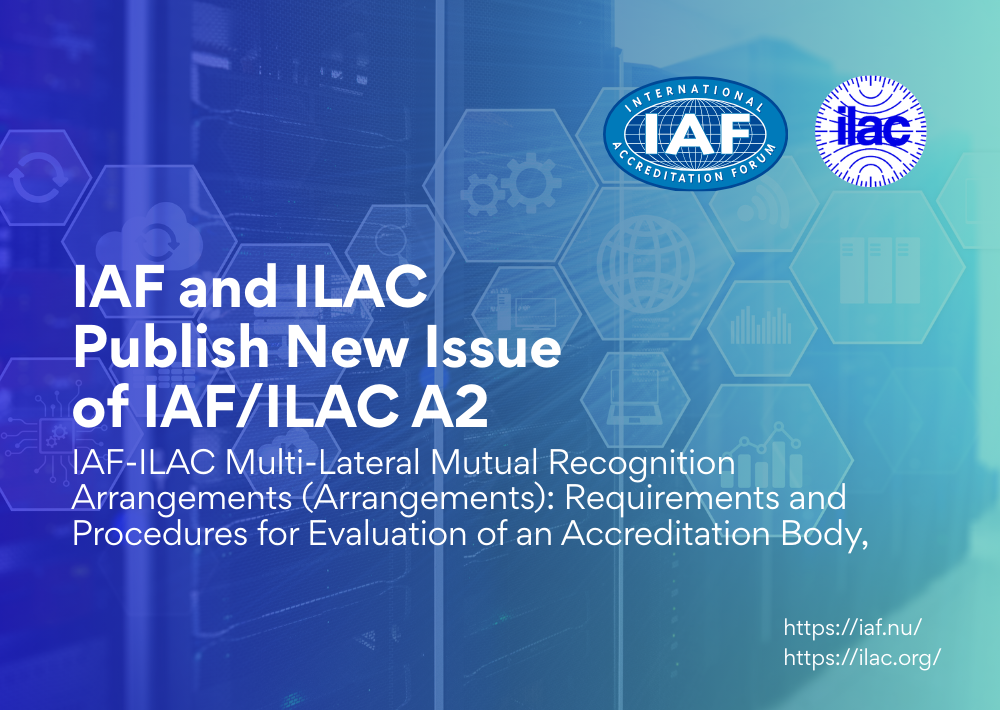
IAF and ILAC members, partners and stakeholders convened in Bangkok, Thailand, this October for the 2025 IAF/ILAC Joint Annual Meetings. Over the course of ten days, delegates from around the world took part in committee meetings, strategic workshops and general assemblies that marked both the culmination of decades of joint work and the beginning of a new era in international accreditation.
The meetings brought together a wide range of activities, including IAF and ILAC committee meetings, the IAF Board meeting, and the separate and joint General Assemblies of both organisations. During the same week, delegates also held the second General Assembly of the Global Accreditation Cooperation Incorporated, the new organisation that will formally succeed IAF and ILAC beginning 01 January 2026.
A major focus throughout the week was preparing for this shift. The launch of the Global Accreditation Cooperation Incorporated represents the next step in a long-standing collaboration between IAF and ILAC, unifying their missions into a single trusted international accreditation organisation. In Bangkok, members approved documents and discussed how existing technical and policy work would continue seamlessly under the new structure, ensuring that the accreditation community will continue giving individuals and organisations worldwide the confidence to trust the accredited processes and results they depend on.
A series of workshops throughout the week highlighted the diversity of topics shaping the future of accreditation. Sessions explored themes such as the growing role of artificial intelligence in conformity assessment, priorities in the field of sustainability, and the role of the conformity assessment ecosystem in supporting regulatory initiatives through mechanisms such as the Carbon Border Adjustment Mechanism (CBAM). The workshops provided valuable opportunities for members to exchange insights and strengthen cooperation.
In closing remarks, IAF Chair Emanuele Riva and ILAC Chair Etty Feller reflected on the historical significance of the Bangkok meetings. They noted that this gathering marked the final time the two organisations would meet in their current forms, a symbolic handover to a unified organisation that will provide one internationally recognised accreditation framework.
The Bangkok meetings were not only an opportunity to review progress and technical achievements but also a moment to celebrate the community’s shared commitment to quality, confidence and collaboration. The launch of the Global Accreditation Cooperation Incorporated on 01 January will build on that legacy, carrying forward the principles of IAF and ILAC into a unified future for global accreditation.


We welcome Nigeria National Accreditation System (NiNAS), Nigeria, as a Full Member of ILAC.
NiNAS joined ILAC as an Affiliate member on 15 December 2017 and then Associate member on 12 June 2018. As NiNAS is a signatory to the AFRAC MRA for the accreditation of calibration and testing laboratories using ISO/IEC 17025, medical testing using ISO 15189 and inspection using ISO/IEC 17020, NiNAS has also been granted signatory status to the ILAC MRA and therefore, Full membership of ILAC.
We welcome NiNAS as a Full Member and look forward to working with our NiNAS colleagues.
The full list of signatories to the ILAC MRA is available here.

The International Society of Organoid Research (ISoOR), Singapore, is welcomed as a Stakeholder member of ILAC.
We welcome ISoOR and look forward to working with our ISoOR colleagues.

IAF and ILAC have published a new issue of IAF/ILAC A2: IAF-ILAC Multi-Lateral Mutual Recognition Arrangements (Arrangements): Requirements and Procedures for Evaluation of an Accreditation Body, which introduces updates aimed at strengthening the evaluation process for accreditation bodies.
The document continues to serve as the reference for Regional Accreditation Groups, ILAC and IAF for evaluating single accreditation bodies for the purpose of signing applicable mutual recognition arrangements. These organisations are required to follow the specified requirements and implement procedures in alignment with IAF/ILAC A2.
The new issue includes a number of key changes:
These revisions aim to improve consistency, adaptability and technical depth in the evaluation of single accreditation bodies, supporting the continued credibility and reliability of the global and regional mutual recognition arrangements.
View the document here

We welcome Azerbaijan Accreditation Centre (AzAK), Azerbaijan, as a Full Member of ILAC.
AzAK joined ILAC as an Affiliate member on 5 October 2012 and then Associate member on 2 March 2018. As AzAK is a signatory to the APAC MRA for the accreditation of calibration and testing laboratories using ISO/IEC 17025, AzAK has also been granted signatory status to the ILAC MRA and therefore, Full membership of ILAC.
We welcome AzAK as a Full Member and look forward to working with our AzAK colleagues.
The full list of signatories to the ILAC MRA is available here.

The signatory status of Organismo Uruguayo de Acreditación (OUA), Uruguay, to the ILAC MRA has been extended to include the accreditation of Inspection (ISO/IEC 17020).
The full list of signatories to the ILAC MRA is available from https://ilac.org/signatory-search/ .

We welcome Icelandic Service for Accreditation (ISAC), Iceland, as a Full Member of ILAC.
As ISAC is a signatory to the EA MLA for the accreditation of inspection bodies using ISO/IEC 17020, ISAC has been granted signatory status to the ILAC MRA and therefore, Full membership of ILAC.
We welcome ISAC and look forward to working with our ISAC colleagues.
The full list of signatories to the ILAC MRA is available here.

The signatory status of Vietnam Institute of Accreditation (VACI), Vietnam, to the ILAC MRA has been extended to include the accreditation of Medical Testing (ISO 15189) and Inspection (ISO/IEC 17020).
The full list of signatories to the ILAC MRA is available from https://ilac.org/signatory-search/ .

The Grain and Feed Trade Association (Gafta), United, Kingdom, is welcomed as a Stakeholder member of ILAC.
We welcome Gafta and look forward to working with our Gafta colleagues.

07 July, 2025
The International Laboratory Accreditation Cooperation (ILAC) and the Grain and Feed Trade Association (Gafta) have formalised their collaboration, recently signing a Memorandum of Understanding (MoU).
ILAC is the specialised body administering a global multilateral Mutual Recognition Arrangement among accreditation bodies responsible for accreditation of conformity assessment bodies, including testing laboratories.
Gafta is the international trade association representing companies involved in the trade of agricultural commodities, spices and general produce. Gafta seeks to promote free trade of agricultural commodities, to encourage an open, predictable trade environment to avoid trade disruption, to promote international standards based on sound science to facilitate trade; and to raise awareness of the instrumental role played by the international trade in transporting safe, sustainable, nutritious and affordable food and feed from areas of surplus to areas of deficit to feed a growing world population and ensure global food security.
ILAC and Gafta have been cooperating since 2021 and have collaborated on the communication of the requirements of Gafta for the inspection of agricultural commodities, general produce, and spices for international trade. Gafta operates a scheme for superintendents and a scheme for analysts that recognise ILAC member accredited inspection bodies and test laboratories within those schemes. You can view and download the MoU here.
Further information on Gafta and its activities is available at: https://www.gafta.com/